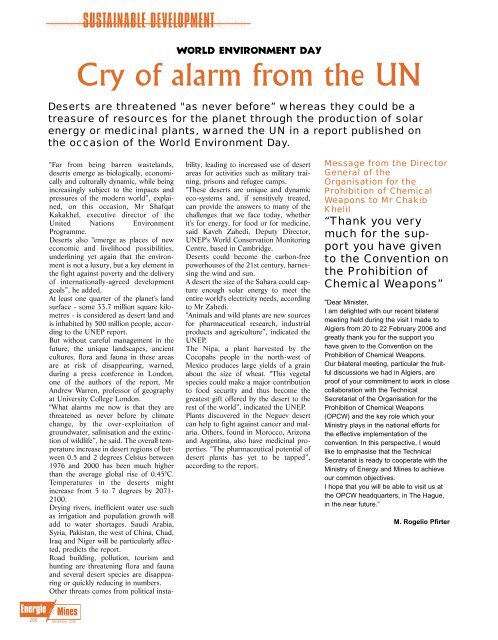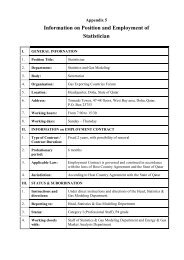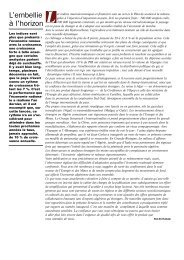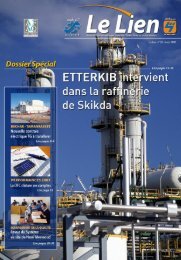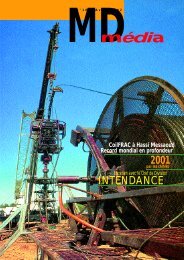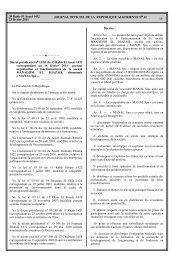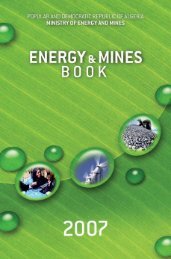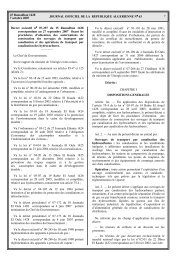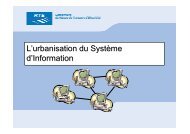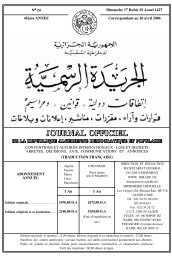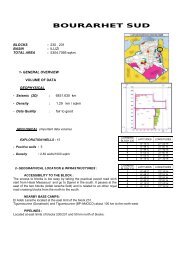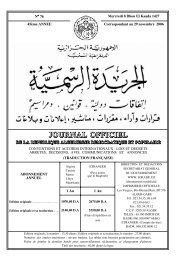Sustainable SUSTAINABLE <strong>de</strong>velopmentDEVELOPMENTWorld Environment DayCry of alarm from the UNDeserts are threatened "as never before” whereas they could be atreasure of resources for the plan<strong>et</strong> through the production of solarenergy or medicinal plants, warned the UN in a report published onthe occasion of the World Environment Day.Energie & Mines200November 2006"Far from being barren wastelands,<strong>de</strong>serts emerge as biologically, economicallyand culturally dynamic, while beingincreasingly subject to the impacts andpressures of the mo<strong>de</strong>rn world”, explained,on this occasion, Mr ShafqatKakakhel, executive director of theUnited Nations EnvironmentProgramme.Deserts also "emerge as places of neweconomic and livelihood possibilities,un<strong>de</strong>rlining y<strong>et</strong> again that the environmentis not a luxury, but a key element inthe fight against poverty and the <strong>de</strong>liveryof internationally-agreed <strong>de</strong>velopmentgoals”, he ad<strong>de</strong>d.At least one quarter of the plan<strong>et</strong>'s landsurface - some 33.7 million square kilom<strong>et</strong>res- is consi<strong>de</strong>red as <strong>de</strong>sert land andis inhabited by 500 million people, accordingto the UNEP report.But without careful management in thefuture, the unique landscapes, ancientcultures, flora and fauna in these areasare at risk of disappearing, warned,during a press conference in London,one of the authors of the report, MrAndrew Warren, professor of geographyat University College London."What alarms me now is that they ar<strong>et</strong>hreatened as never before by climatechange, by the over-exploitation ofgroundwater, salinisation and the extinctionof wildlife”, he said. The overall temperatureincrease in <strong>de</strong>sert regions of b<strong>et</strong>ween0.5 and 2 <strong>de</strong>grees Celsius b<strong>et</strong>ween1976 and 2000 has been much higherthan the average global rise of 0.45°C.Temperatures in the <strong>de</strong>serts mightincrease from 5 to 7 <strong>de</strong>grees by 2071-2100.Drying rivers, inefficient water use suchas irrigation and population growth willadd to water shortages. Saudi Arabia,Syria, Pakistan, the west of China, Chad,Iraq and Niger will be particularly affected,predicts the report.Road building, pollution, tourism andhunting are threatening flora and faunaand several <strong>de</strong>sert species are disappearingor quickly reducing in numbers.Other threats comes from political instability,leading to increased use of <strong>de</strong>sertareas for activities such as military training,prisons and refugee camps."These <strong>de</strong>serts are unique and dynamiceco-systems and, if sensitively treated,can provi<strong>de</strong> the answers to many of thechallenges that we face today, wh<strong>et</strong>herit's for energy, for food or for medicine,said Kaveh Zahedi, Deputy Director,UNEP's World Conservation MonitoringCentre, based in Cambridge.Deserts could become the carbon-freepowerhouses of the 21st century, harnessingthe wind and sun.A <strong>de</strong>sert the size of the Sahara could captureenough solar energy to me<strong>et</strong> theentire world's electricity needs, accordingto Mr Zahedi."Animals and wild plants are new sourcesfor pharmaceutical research, industrialproducts and agriculture”, indicated theUNEP.The Nipa, a plant harvested by theCocopahs people in the north-west ofMexico produces large yields of a grainabout the size of wheat. "This veg<strong>et</strong>alspecies could make a major contributionto food security and thus become thegreatest gift offered by the <strong>de</strong>sert to therest of the world”, indicated the UNEP.Plants discovered in the Neguev <strong>de</strong>sertcan help to fight against cancer and malaria.Others, found in Morocco, Arizonaand Argentina, also have medicinal properties."The pharmaceutical potential of<strong>de</strong>sert plants has y<strong>et</strong> to be tapped”,according to the report.Message from the DirectorGeneral of theOrganisation for theProhibition of ChemicalWeapons to Mr ChakibKhelil“Thank you verymuch for the supportyou have givento the Convention onthe Prohibition ofChemical Weapons”"Dear Minister,I am <strong>de</strong>lighted with our recent bilateralme<strong>et</strong>ing held during the visit I ma<strong>de</strong> toAlgiers from 20 to 22 February 2006 andgreatly thank you for the support youhave given to the Convention on theProhibition of Chemical Weapons.Our bilateral me<strong>et</strong>ing, particular the fruitfuldiscussions we had in Algiers, areproof of your commitment to work in closecollaboration with the TechnicalSecr<strong>et</strong>ariat of the Organisation for theProhibition of Chemical Weapons(OPCW) and the key role which yourMinistry plays in the national efforts forthe effective implementation of theconvention. In this perspective, I wouldlike to emphasise that the TechnicalSecr<strong>et</strong>ariat is ready to cooperate with theMinistry of Energy and Mines to achieveour common objectives.I hope that you will be able to visit us atthe OPCW headquarters, in The Hague,in the near future.”M. Rogelio Pfirter
ChronicleControlling the clean <strong>de</strong>velopment mechanismsA major challenge of the century"The earth is blueas an orange”(Paul Eluard)BySliman Dakar *The plan<strong>et</strong> is shrinking, space nolonger counts and the clock isticking. This is the reality ofglobalisation such as is happeningun<strong>de</strong>r our eyes and whichacutely poses the question of dialogue,collaboration and cooperation at the entirehumanity's scale, of which the inter<strong>de</strong>pen<strong>de</strong>nceof interests and the communityof fate have become a burning and pressingproof.Hence, mobilisation at an internationallevel is <strong>de</strong>emed imperative to protect, forexample, the plan<strong>et</strong> from global warming -a major challenge for sustainable <strong>de</strong>velopment.It is within this framework of globalinternational action, therefore, that fallsthe successive ratification by Algeria of theUnited Nations Framework Conventionon Climate Change in June 1993 and theKyoto Protocol, as of its entry in force in2005.The time has now come to recall all theefforts ma<strong>de</strong>, in these last few years, byAlgeria at the various institutional, legaland regulatory levels thanks to the reformsintroduced in the Energy and Mines sectorand which grant priority to the preoccupationof sustainable <strong>de</strong>velopment.The law on energy savings, constantimprovement of energy efficiency, thepromotion of renewable energies and thereduction of our energy systems' negativeimpacts are all indissolubly related objectives.In the aftermath of this major law, a nationalenergy savings programme, up to2010, was drawn up, whose impacts willhave a catalysing effect in favour of thevoluntarist objectives which the sector hass<strong>et</strong> down within the framework of theKyoto Protocol.But that's not all : over these last fewyears, a whole series of laws have beenpromulgated which govern the electricityand gas sector, the domain of renewableenergies and the hydrocarbons sector:they have all been drawn up whilst beingmindful of ensuring that the reformsun<strong>de</strong>rtaken are fully consistent. All theselaws have, in common, a concern for establishingthe environmental dimension,which thus takes on, in each of them, anew priority within the framework of ourenergy policy.This is therefore a very obvious <strong>de</strong>sire tos<strong>et</strong> up a series of international institutionsand their prescriptions and recommendations.Algeria is, thus, <strong>de</strong>termined to mobilise allthe potentials of the energy sector so as tocontribute efficiently to the internationalgreenhouse gas reduction programme,whilst respecting the tim<strong>et</strong>able used by theKyoto Protocol.This inclu<strong>de</strong>s the urgent putting in placeof the Designated National Authority - thecentre of the system which will be responsiblefor ruling on the projects eligible forthe financing mechanisms provi<strong>de</strong>d by theProtocol - the clean <strong>de</strong>velopment mechanism- and for submitting these projectsfor validation to the international bodyconcerned.The objective is to finally put this institutionin place as quickly as possible. Thisauthority will <strong>de</strong>finitely be an invaluablesupport and an irreplaceable tool of ouraction within the framework of the implementationof the protocol.Consi<strong>de</strong>rable effort has been put in by theEnergy and Mines sector in favour of promotingsustainable <strong>de</strong>velopment: theLPG-fuel, compressed natural gas, unlea<strong>de</strong>dp<strong>et</strong>rol promotion projects, for example,are thus part of the implementation ofa national energy consumption mo<strong>de</strong>l.This mo<strong>de</strong>l favours the priority use ofclean fossil fuels, such as natural gas,which we have in abundance, and LPG;but it also grants specific importance tothe <strong>de</strong>velopment of the national potentialin terms of renewable energies: the promotionof solar energy is thus un<strong>de</strong>rgoingspectacular acceleration with, particularly,the launch of the important hybrid solargaspower plant in Hassi R'mel, amongmany others that are eligible for the clean<strong>de</strong>velopment mechanism's financing.How can Algeria's pioneer role in theinternational action targ<strong>et</strong>ing the total eliminationof flared gases - som<strong>et</strong>hingwhich will be done by our country in 2010- and in the action related to the impoundingof carbon gas fail to be noticed giventhe experience initiated by Sonatrach inassociation with BP and Statoil on the InSalah acreage, for example ?We can further mention the drawing upand implementation of an ambitious HSEpolicy including, particularly, large-scaleprojects in the domain of industrial saf<strong>et</strong>y,the action targ<strong>et</strong>ing b<strong>et</strong>ter control of town<strong>de</strong>velopment and territorial planning withthe Hassi Messaoud city relocation project,finally, the preoccupation of protectingthe coastline against the major risksof marine pollution through the creationof a specialised multinational company,whose vocation will be to interveneagainst acci<strong>de</strong>ntal spills of hydrocarbonson the African coasts.We now need to draw up a systematicinventory of the projects eligible for theCDM financing in the domains and activitiesin relation to the <strong>de</strong>velopment of theenergy sector, such as the renewable energies,energy savings, “clean” fuels, therecovery of flared gases and the recoveryof CO2. We must move fast.Algeria is therefore clearly showing its<strong>de</strong>termination to fully adhere to the internationalrecommendations and prescriptionswhich aim to promote clean <strong>de</strong>velopment.It calls upon its partners in favour ofmobilisation around the investmentopportunities which the Energy sectoroffers in Algeria. We are greatly countingon their experience and their contributionto the i<strong>de</strong>ntification of common projectseligible for the clean <strong>de</strong>velopment mechanism.We have the right - or b<strong>et</strong>ter still, we hav<strong>et</strong>he duty - to launch such an appeal sinc<strong>et</strong>his means protecting and saving the BluePlan<strong>et</strong>…S. D.(*) Expert consultantEnergie & Mines201November 2006


